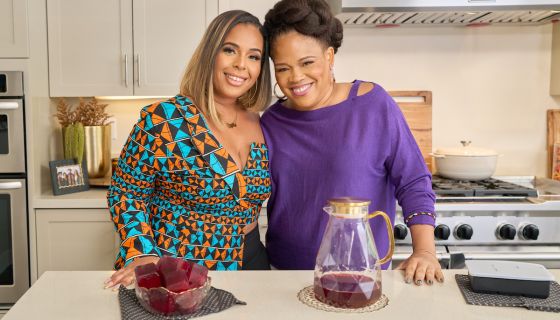[ad_1]
Habari Gani! Today marked the start of Kwanzaa and along with it, the new Food Network digital series The Kwanzaa Menu.
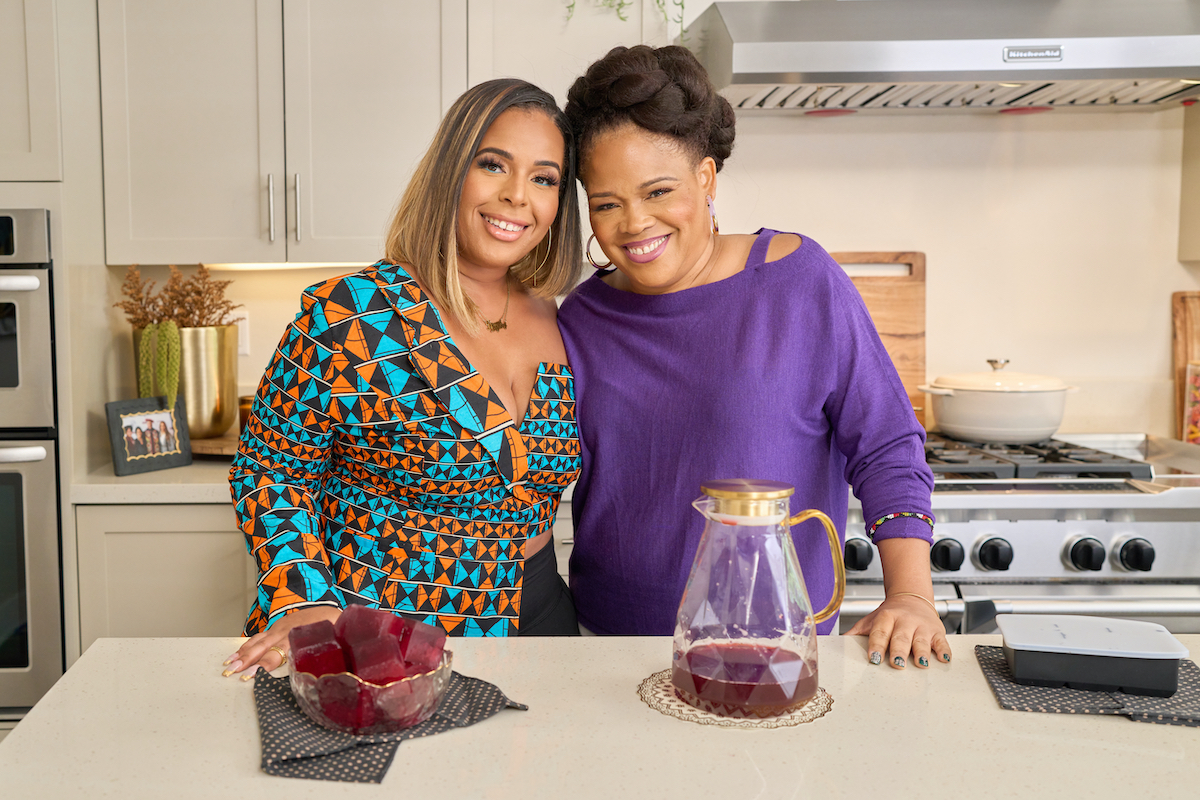
Source: Courtesy / Food Network
Hosted by Tonya Hopkins, aka “The Food Griot,” a show host, legacy cook, drink designer, and culinary history consultant, The Kwanzaa Menu, premieres today Monday, December 26th. In the brand-new series, Tonya invites some of her favorite people to celebrate Kwanzaa and its traditions through food and conversation. In each of the seven episodes, Tonya and a special guest prepare a recipe that is connected to the day’s celebration. Together they commemorate each day of Kwanzaa by cooking meaningful dishes and discussing the Nguzu Saba, the seven principles, and the history of the holiday. When presented together, the collective dishes create a meaningful and celebratory Kwanzaa Menu.
Series guests include entrepreneur and actor Kareem Grimes (All American, For the Love of Jason); Kenya Parham, cultural strategist, strategic communicator, entrepreneur and thought leader, and Tonya’s sister; Dr. Thomas A. Parham, President of California State University, Dominguez Hills, author, scholar and Tonya’s father; actor, director, speaker, author, entrepreneur and food enthusiast Taja V. Simpson (Tyler Perry’s The Oval); Blue Telusma, columnist, social justice advocate, and spiritualist; and chef Brittney “Stikxz” Williams who creates dishes spotlighting the Caribbean diaspora.
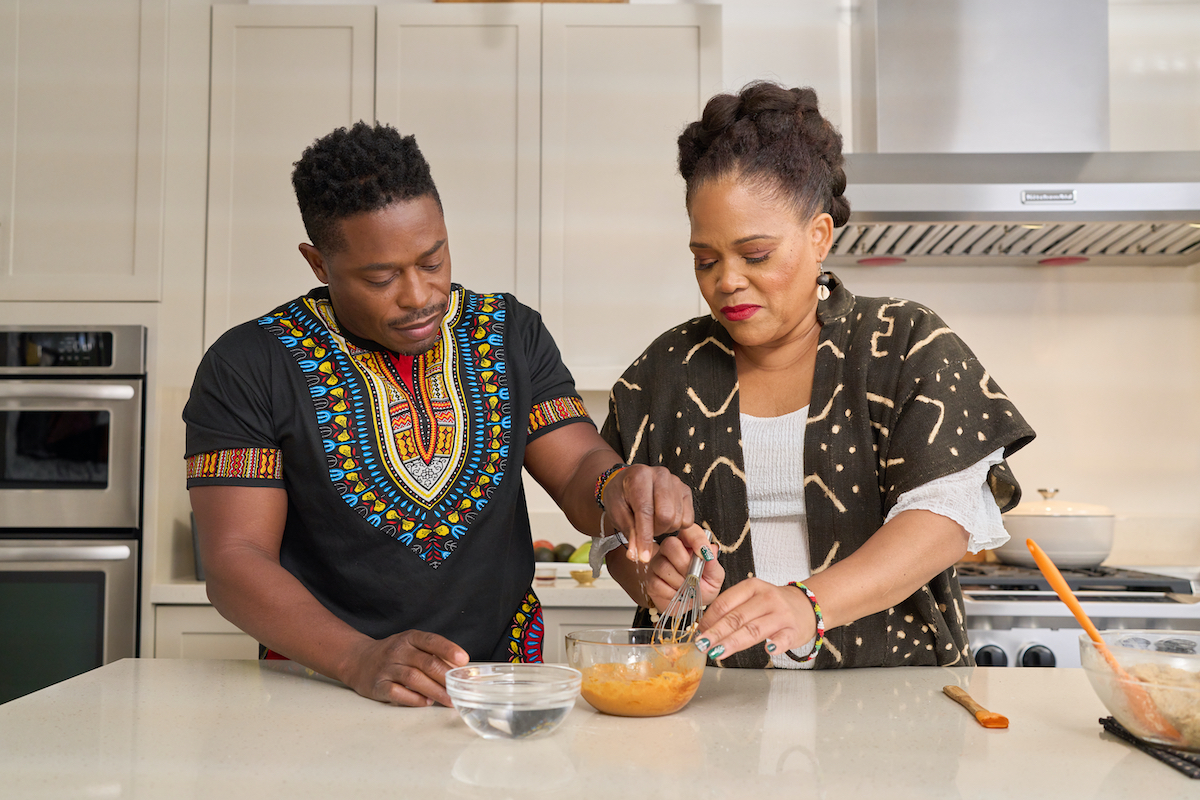
Source: Courtesy / Food Network
We chatted with Tonya Hopkins and her sister Kenya Parham about working with family and their inspirations for The Kwanzaa Menu.
Is the menu vegan? From the dishes we saw they were primarily plant-based.
“We’ve got chicken and snapper and spiny lobster, but it’s very plant-based leaning,” Kenya Parham told BOSSIP.
“Out the gate I intentionally chose fresh, naturally delicious, nutritious ingredients for each of the recipes, to remind us of the culinary brilliance of our ancestors that they brought to this new world, in ways that have long contributed to vitality and longevity,” Tonya Hopkins added. “Our food is not poison or a problem. Scraps from massa’s table was not the only narrative. We hunted, fished, foraged, we were in charge of the food ways.”
“This menu is very much a reclamation of what is ours,” Kenya continued. “What I love most about what my sister’s work does is that she seeks to reconnect Black culinary contribution to American foodways throughout history.”
“I went plant-based vegan five years ago and a part of that journey is I wanted much greater alignment with my mind, heart, and body. In making that choice to convert, I realized I was getting closer to what was authentically, organically genealogically for me by going plant-based, because so much food in the African diaspora is inherently plant-based. What Tonya’s work has done over the years is examine culinary contributions beyond slavery, beyond the South and beyond soul food. Even though we traditionally lean into soul food, we wanted to show that there is a lot of other food we can eat that is also Black food, that is not necessarily the fried chicken and the macaroni and cheese and the things that we are used to. We wanted to bring a newness to this menu and we accomplished that.”
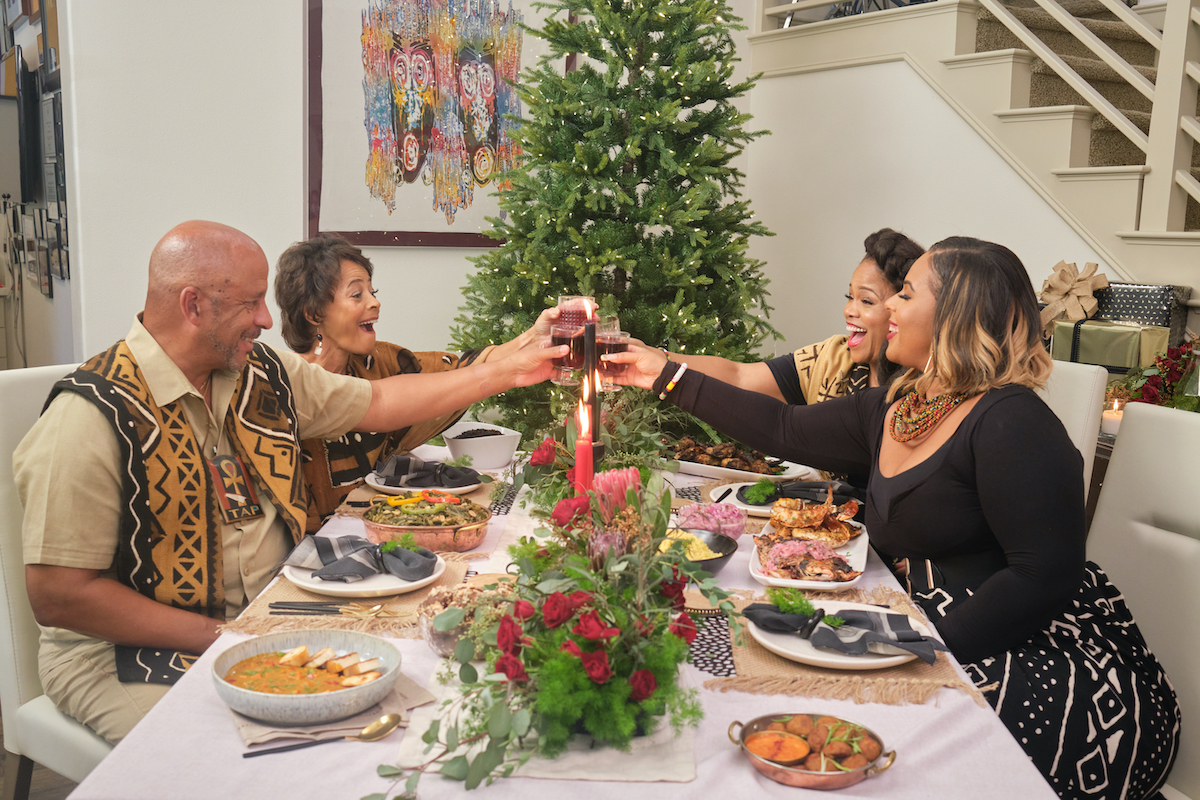
Source: Courtesy / Food Network
How will the show also educate viewers about Kwanzaa?
“Kwanzaa is a cultural holiday steeped in intention. So every single principle, starting with unity, ending with faith, and in the middle we’ve got things like collective work and responsibility, creativity, cooperative economics, purpose, these principles are affirmations,” Kenya Parham told BOSSIP. “Now we’re in a day and age when everybody wakes up and they want to set their intentions and do their journals, and post on the gram and do all that stuff. Kwanzaa was created with intention. They been on that. What a beautiful opportunity to end our year and start our year with such intention that really when you look at it, is a blueprint for how Black folks should be living our lives. Just imagine if we all kept those principles at the tops of our minds and our walks and our works and how we dealt with each other. The biggest education that we wanted to provide was, living with that intention, starting with how we feed ourselves, food is the number one way in which we self medicate on a daily basis, if we start with that intention, hopefully our minds, our bodies, our beings, our happiness, our outcomes will be much better informed from that.”
“There are simple ways to celebrate it,” Tonya Hopkins continued. “Literally the way the menu was designed, this is part of a series, there was a Lunar New Year Menu, a Diwali Menu, and a Juneteenth Menu. These dishes are an amuse bouche to Kwanzaa. Simplifying Kwanzaa, to find simple ways to celebrate, through food and drinking, to find fun creative ways and then co-creating with my brilliant sister, we took this Kwanzaa concoction I came up with that has hibiscus and red rooibos, all these ancestrally inspired ingredients that started off as this beautiful vibrant hot red drink, and then we turned it into a mimosa. It went from mocktail to cocktail. Kwanzaa was not designed to be a commercial thing, but intention is woven throughout, education is woven throughout and because food is something people love to consume, we tried our darndest to make it as delicious and delectable as possible. That drink was chosen intentionally for the first day, so that you are prepared to raise a glass to celebrate or to pour out libations. Raise a glass to celebrate ourselves or to pour libations to our ancestors, which is a key part of Kwanzaa. That’s why that recipe comes first.”
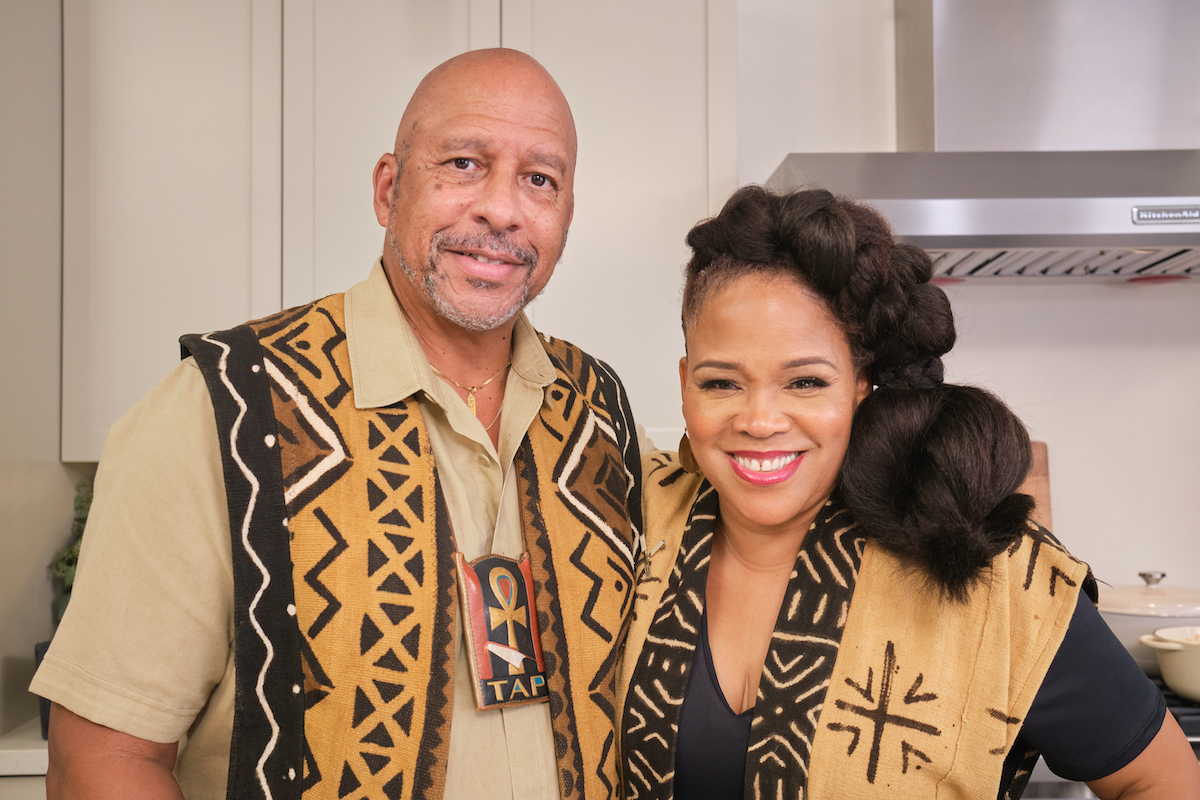
Source: Courtesy / Food Network
What was it like working with with family members for the show?
“We turned our parents’ house into a set,” Tonya told BOSSIP. “We turned our Black mother’s kitchen and took it over. Working and collaborating as a family is something we’ve always done, we’re just tight like that. We feel really grateful to be blessed with the resources and the networks, and the support that we have to be able to build on our own. Whenever we get opportunities to collab, we do that.”
“I’m the baby and my sister has been including me in her work since back in the days,” Kenya added. “When she was an advertising exec she would include me in her focus groups and ask me questions and ask me to collaborate. The culture of collaboration has always been alive in our relationship as sisters. As my sister has watched me come into womanhood, what I always constantly feel is her deep respect for my ideas and my professionalism, we just love making magic together. It was super fun. We’ve never seen our Dad in the kitchen. Dad likes to be on the grill, Dad is the grillmaster but we rarely see him in the kitchen, his sous chef skills were so good.”
“That was the biggest surprise of the production,” Tonya interjected. “He was watching the recipe and stirring the pot while talking. It all worked together because this topic is something native and organic to us. It’s through him that it’s such an important part of our family culture, being a native son of South Central in the time when Kwanzaa was coming up too. Being part of that circle of Afrocentricity and the importance of that as an identity as a Black psychologist. It just all connected. I was grateful to be in the kitchen with him because it’s through him that I developed my hunger to learn more about it and to become a Kwanzaa food scholar. I wrote the Kwanzaa entry, the foods associated with Kwanzaa, for the Oxford Encyclopedia of Food in America 15 years ago or so and got to talk to Dr. Karenga (Kwanzaa’s founder Maulana Karenga) through the academic networks through our parents, and was the only one to ask him directly about the food.”
“That wasn’t the only family involved in this project,” Kenya added. “If include the crew, our cousins were part of it, we had brother and sister DPs, the folks who came on as talent are our friends, we didn’t go through a single agent, this is really our tribe, it felt like a familial project.”
Check out a breakdown of the episodes below:
Umoja (Unity) | Amazing Hibiscus Mulled Wine Kwanzaa Mimosa
Tonya is joined by her sister, Kenya Parham, and they prepare Amazing Hibiscus Mulled Wine Kwanzaa Mimosa, a recipe to celebrate the first day of Kwanzaa and the principle of Umoja (unity) which emphasizes the importance of unity in all areas, including family, community, nation and race. Traditionally libations, served in a Kikombe Cha Umoja (Unity Cup) are presented to acknowledge and honor the family units of present and past, and the center black candle of the Kinara is lit.
Kujichagulia (Self-Determination) | Crispy Akara (Black-Eyed Pea Fritters) with Savory Smoky Sesame Sauce
The principle of Kujichagulia focuses on building one’s identity as a person and a community and in honor of that, Tonya cooks up her Crispy Akara (Black-Eyed Pea Fritters) with Savory Smoky Sesame Sauce with the help of special guest, Kareem Grimes. The majority of Black Americans descended from (or passed through) the West African region and the recipe is a way to make culinary contact and acknowledge that point of origin and ancestral journey. On this day, the first red candle on the Kinara is lit.
Ujima (Collective Work and Responsibility) | Good Deeds Greens
In this episode actress Taja V. Simpson joins Tonya to make Good Deeds Greens, a dish that embodies the principle of the day, Ujima. Ujima focuses on collective work and shared responsibility for both achievements and setbacks in the community and comes to life with this all-hands-on-deck recipe as they work together to clean and dice up the southern-style greens for this special dish. The first green candle on the Kinara is lit.
Ujamaa (Cooperative Economics) | Black Sable Rice Calas
The principle of Ujamaa reinforces the third day’s principle, Ujima, by encouraging support of each other economically and within the community. Blue Telusma helps Tonya in the kitchen to prepare Black Sable Rice Calas and discuss the origin of this dish created by Black women, as well as the history of Black Americans as the first food vendors and successful culinary entrepreneurs in America. The second red candle is lit on the Kinara.
Nia (Purpose) | First Fruits Harvest Smoothie Bowl
The principle of Nia means purpose and encourages us to move through life with intention, being mindful with our words and actions. In this episode, sisters Tonya and Kenya discuss restoration through healthy plant-based living while building this red, black and green First Fruits Harvest Smoothie bowl. On this day, the second green candle on the Kinara is lit.
Kuumba (Creativity) | Yassa-Inspired Grilling
The principle of Kuumba is a time to reflect on leaving the community more beautiful and beneficial than we inherited it; to celebrate creativity and ingenuity by paying homage to creative works (culinary, visual art, dance, music, literature) focusing on our rich history and vibrant future. Tonya is joined by Chef Brittney “Stikxz” Williams, and they set creativity ablaze, developing a new seasoning blend that incorporates Caribbean influences over open-fire grilling. On this day the third red candle on the Kinara is lit.
Imani (Faith) | Cassava with Peanut Stew
On the seventh and final day of Kwanzaa, the last green candle on the Kinara is lit for the principle of Imani. Imani acknowledges that at the root of all we do and who we are is spirit. On this day the focus is on spiritual faith, a faith in one’s infinite possibilities, and a faith that persists through life’s challenges and adversities. Tonya and her father, Dr. Thomas Parham, a distinguished pillar of the community, share space in their family kitchen and learn from one another while making a dish representative of Africans in the New World, Cassava with Peanut Stew.
The Kwanzaa Menu is produced by Best Wishes Studio for Food Network.
Fans can join the conversation on social using #KwanzaaMenu and find recipes, watch episodes and more at FoodNetwork.com.
[ad_2]





